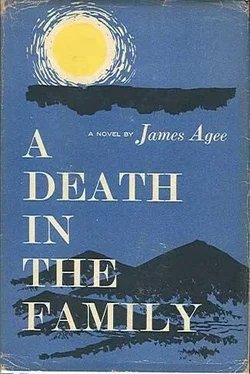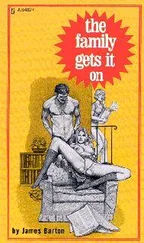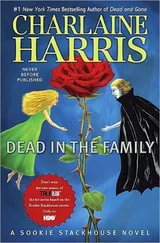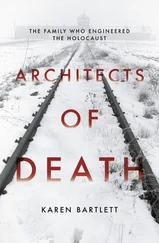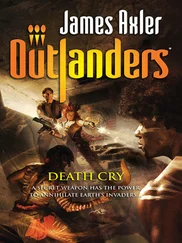But God showed her only what she knew already: that come what might she must, as a Christian woman, as a Catholic, bring up her children thoroughly and devoutly in the Faith, and that it was also her task, more than her husband's, that the family remain one, that the gulf be closed.
But if I do this, nothing else that I can do will close it, she reflected. Nothing, nothing will avail.
But I must.
I must just: trust in God, she said, almost aloud. Just: do His will, and put all my trust in Him.
A streetcar passed; Catherine cried.
"Daddy had to go up to see Grandfather Follet," their mother explained. "He says to kiss both of you for him and he'll probably see you before you're asleep tonight."
"When?" Rufus asked.
"Way, early this morning, before it was light."
"Why?"
"Grampa Follet is very sick. Uncle Ralph phoned up very late last night, when all of us were asleep. Grampa has had one of his attacks."
"What's attack?"
"Eat your cereal, Catherine. Rufus, eat yours. His heart. Like the one he had that time last fall. Only worse, Uncle Ralph says. He wanted very much to see Daddy, just as quick as Daddy could come."
"Why?"
"Because he loves Daddy and if… Eat, wicker, or it'll all be nasty and cold, and then you know how you hate to eat it. Because if Daddy didn't see him soon, Grampa might not get to see Daddy again."
"Why not?"
"Because Grampa is getting old, and when you get old, you can be sick and not get well again. And if you can't get well again, then God lets you go to sleep and you can't see people any more."
"Don't you ever wake up again?"
"You wake up right away, in heaven, but people on earth can't see you any more, and you can't see them."
"Oh."
"Eat," their mother whispered, making a big, nodding mouth and chewing vigorously on air. They ate.
"Mama," Rufus said, "when Oliver went to sleep did he wake up in heaven too?"
"I don't know. I imagine he woke up in a part of heaven God keeps specially for cats."
"Did the rabbits wake up?"
"I'm sure they did if Oliver did."
"All bloody like they were?"
"No, Rufus, that was only their poor little bodies. God wouldn't let them wake up all hurt and bloody, poor things."
"Why did God let the dogs get in?"
"We don't know, Rufus, but it must be a part of His plan we will understand someday."
"What good would it do Him?"
"Children, don't dawdle. It's almost school time."
"What good would it do Him, Mama, to let the dogs in?"
"I don't know, but someday we'll understand, Rufus, if we're very patient. We mustn't trouble ourselves with these things we can't understand. We just have to be sure that God knows best."
"I bet they sneaked in when He wasn't looking," Rufus said eagerly. "Cause He sure wouldn't have let them if He'd been there. Didn't they, Mama? Didn't they?"
Their mother hesitated, and then said carefully, "No, Rufus, we believe that God is everywhere and knows everything and nothing can happen without His knowing. But the Devil is everywhere too-everywhere except heaven, that is-and he is always tempting us. When we do what he tempts us to do, then God lets us do it."
"What's tempt?"
"Tempt is, well, the Devil tempts us when there is something we want to do, but we know it is bad."
"Why does God let us do bad things?"
"Because He wants us to make up our own minds."
"Even to do bad things, right under His nose?"
"He doesn't want us to do bad things, but to know good from bad and be good of our own free choice."
"Why?"
"Because He loves us and wants us to love Him, but if He just made us be good, we couldn't really love Him enough. You can't love to do what you are made to do, and you couldn't love God if He made you."
"But if God can do anything, why can't He do that?"
"Because He doesn't want to," their mother said, rather impatiently.
"Why doesn't He want to?" Rufus said. "It would be so much easier for Him."
"God-doesn't-believe-in-the-easy-way," she said, with a certain triumph, spacing the words and giving them full emphasis. "Not for us, not for anything or anybody, not even for Himself. God wants us to come to Him, to find Him, the best we can."
"Like hide-and-go-seek," said Catherine.
"What was that?" their mother asked rather anxiously.
"Like hide…"
"Aw, it isn't a bit like hide-and-seek, is it, Mama?" Rufus cut in. "Hidenseek's just a game, just a game. God doesn't fool around playing games, does He, Mama! Does He! Does He!"
"Shame on you, Rufus," his mother said warmly, and not without relief. "Why, shame on you!" For Catherine's face had swollen and her mouth had bunched tight, and she glared from her brother to her mother and back again with scalding hot eyes.
"Well He doesn't," Rufus insisted, angry and bewildered at the turn the discussion had taken.
"That's enough, Rufus," his mother whipped out sternly, and leaned across and patted Catherine's hand, which made Catherine's chin tremble and her tears overflow. "That's all right, little wicker! That's all right! He doesn't play games. Rufus is right about that, but it is, someways it is like hide-and-seek. You're ab-so-lootly right!"
But with this, Catherine was dissolved, and Rufus sat aghast, less at her crying, which made him angry and jealous, than at his sudden solitude. But her crying was so miserable that, angry and jealous as he was, he became ashamed, then sorry for her, and was trying, helplessly, to find a way of showing that he was sorry when his mother glanced up at him fiercely and said, "Now you march and get ready for school. I ought to tell Daddy, you're a bad boy!"
At the door, a few minutes later, when she leaned to kiss him good-bye and saw his face, she mistook the cause of it and said, more gently but very earnestly: "Rufus, I can see you're sorry, but you mustn't be mean to Catherine. She's just a little girl, your little sister, and you mustn't ever be unkind to her and hurt her feelings. Do you understand? Do you, Rufus?"
He nodded, and felt terribly sorry for his sister and for himself because of the gentleness in his mother's voice.
"Now you come back and tell her how sorry you are, and hurry, or you'll be late for school."
He came in shyly with his mother and came up to Catherine; her face was swollen and red and she looked at him bleakly.
"Rufus wants to tell you how sorry he is, Catherine, he hurt your feelings," their mother said.
Catherine looked at him, brutally and doubtfully.
"I am sorry, Catherine," he said. "Honest to goodness I am. Because you're a little, little girl, and…"
But with this Catherine exploded into a roar of angry tears, and brought both fists down into her plate, and Rufus, dumfounded, was hustled brusquely off to school.
When Jay found how things were at the farm, he was angry at having been so grieved and alarmed; before long, he felt it had all happened very much as he had suspected. Ralph had just lost his head, as usual. Now he was very much ashamed of himself, though still very defensive, and everyone, including Jay, tried to assure him that he had done the right thing. Jay could imagine how much Ralph had needed to feel useful, to take charge. He couldn't think very well of him, but he was sorry for him. He felt he understood very well how it had happened.
Actually, he understood only a little about it, and Ralph understood very little more.
Late in the evening before, their father had suffered a much more severe and painful attack than any up to then. After no more than a few minutes, his wife had realized its terrible gravity, and had woken Thomas Oaks. Thomas had hurried across the hill and roused up Jessie and George Bailey and, without waiting for them, had hurried back, saddled the horse, and whipped it as fast as it would go, into LaFollette. The doctor was out on a call; he left a message, and hurried on to Ralph's. Ralph was in a virtual panic of aroused responsibility the instant he heard the news. He asked if the doctor was there yet. Thomas told him; Ralph realized that his mother had told Thomas to rush out the doctor even before he called her son to her side. He put it aside as an ungenerous and mean-spirited thought, yet it stayed, hurting him like a burr. He felt it was no time for resentments, though; not only he, but Sally as well, must come to their help, must be there (Sally'd never forgive me if she wasn't) if Paw was to die (she'd be the only wife there, of the only son; his mother would never forget that). He rushed back and told her what was happening as he hurried into his clothes, hurried two doors away, banged loudly on the Felts's door, and apologized for the banging by explaining (his voice was already damp) that his Paw was at death's door if not already passed on, and he wouldn't have roused them only he knew they would be only too willing to help out so Sally could go too. They were very kind to him; Mrs. Felts arrived before Sally had finished fixing her hair. While she was doing so, Ralph sped across the street to his office, unlocked his desk, and took two choking swallows of whiskey in the dark. He rammed the bottle into his pocket and hurried down to start his car. They had been so quick that they overtook Thomas on his horse when he had scarcely passed the edge of town, going, as Ralph said to himself, his eyes low and cold above the steering wheel, "like sixty," or anyhow as fast as it was safe to travel on these awful roads, perhaps a little faster, thinking of Barney Oldfield, in the Chalmers he had chosen because it was a better class of auto and a more expensive one than his brother's, a machine people made no smart jokes about. His first impulse, when he saw the horse and rider ahead, was to honk, both in self-advertisement, warning and greeting, but he remembered in time the seriousness of the occasion and did not do so, reflecting, after it was too late, that Thomas might feel he was snubbed, as if he had passed him in the street without speaking, and he was angry with Thomas for possibly having any such feeling about such petty matters, at such a time.
Читать дальше
